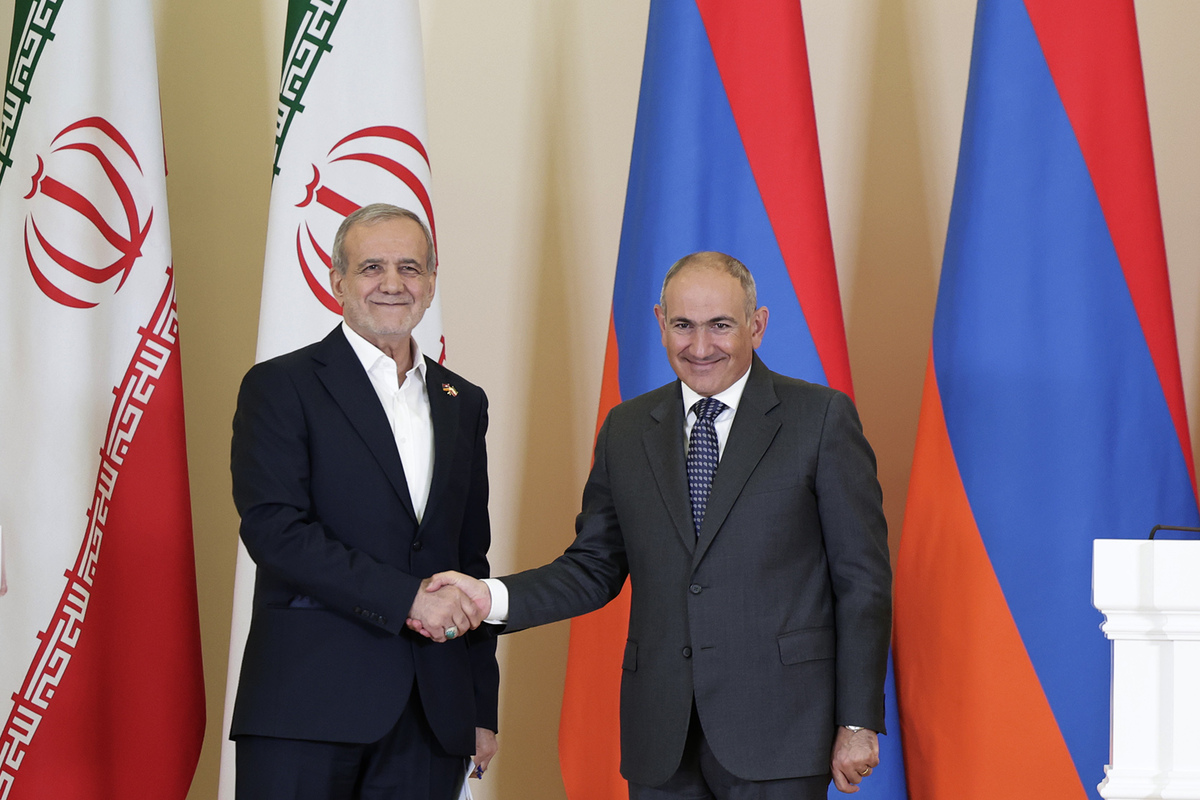Armenian Prime Minister Nikol Pashinyan and Iranian President Masoud Pezeshkian met in Yerevan on August 19 during Pezeshkian’s two-day official visit. The leaders held private and extended discussions, signed a joint declaration, and participated in the Armenia-Iran Business Forum, where they outlined plans to deepen bilateral cooperation and expand trade to new heights.
Armenia and Iran are planning to increase their bilateral trade to $3 billion, a goal highlighted during the opening of the Armenia-Iran Business Forum in Yerevan, attended by Pashinyan and Pezeshkian. The forum aims to deepen economic ties, promote investment and technological exchange, and create opportunities for joint projects.
During his speech, Pashinyan emphasized that economic relations are central to the broader partnership between the two countries. “With today’s joint declaration, we have reaffirmed our goal of raising bilateral trade to $1 billion and eventually $3 billion,” he said. “Achieving these targets will require a leading role from the business community.” He noted that trade between Armenia and Iran reached $748 million last year, up nearly 6%, with imports from Iran growing over 10% in the first half of 2025. Exports continue to include electricity, copper concentrate, and agricultural products. Pashinyan stressed the importance of joint production and value-added cooperation.
The Prime Minister also highlighted the development of cross-border infrastructure in energy, transport, and logistics, in line with Armenia’s “Crossroads of Peace” initiative, which Iranian companies are supporting, including the construction of a 32-kilometer road segment from Agarak to Kajaran. Armenia is positioned as a strategic gateway for Iran to the Eurasian Economic Union and the European Union.
President Pezeshkian said that expanding trade and removing obstacles for investors and businesses were central to the forum’s discussions. He emphasized that reaching the $3 billion target is achievable with the support of both governments, but ultimately depends on producers, investors, and industry representatives.
In a briefing with journalists, Armenian Economy Minister Gevorg Papoyan explained that the recent agreements with Iran will strengthen cooperation in tourism, cultural heritage, and standards and certification systems. “The first document will boost tourism,” he said, noting it will simplify travel to Iran and promote reciprocal visits. “The second document is aimed at deepening trade-commercial ties, particularly in standard certification systems. This is about the processes during exports and imports at the border and prior to reaching the border being simplified, for businesses to deal with one single, accessible and predictable method instead of several standards.”
The leaders signed a joint declaration, reaffirming their commitment to strengthening the strategic partnership between Armenia and Iran and expanding cooperation across political, economic, and cultural spheres. Several memoranda of understanding were also signed between the countries’ ministries, covering areas such as political consultations, tourism, vocational education, urban development, pharmaceuticals, culture, and cinema.
Key Points from the Declaration Include:
- Political Dialogue: Regular high-level consultations and continued cooperation regardless of global changes.
- Territorial Integrity: Commitment to international law, sovereignty, and territorial integrity, condemning recent attacks against Iran.
- Trade Expansion: Increase bilateral trade to $3 billion, boost mutual investments, and implement infrastructure projects.
- Transportation: Emphasized the Persian Gulf–Black Sea corridor, second Araks River bridge, and cross-border infrastructure.
- Energy Projects: Complete the third power transmission line and expand gas-electricity exchange.
- Environmental Issues: Jointly address Araks River pollution.
- People-to-People Ties: Promote tourism, cultural exchange, and simplified travel.
- Regional Peace: Support Armenia–Azerbaijan peace talks, respecting borders and sovereignty.
- Security: Joint efforts against terrorism, organized crime, and drug trafficking.
- Parliamentary and Civil Cooperation: Closer ties between legislative bodies and cultural institutions.
- “Crossroads of Peace”: Support Armenia’s regional initiative for transportation connectivity.
Armenian Prime Minister Nikol Pashinyan and Iranian President Masoud Pezeshkian also held a joint press conference, during which they discussed broader regional issues. Recent tensions over the US-managed “Trump Route” connecting Azerbaijan to Nakhichevan through Armenian territory were acknowledged, but Pezeshkian did not comment directly on the project. Pashinyan emphasized that any connection routes through Armenia would remain under Armenian jurisdiction and security.
During the press conference, Pashinyan noted that both countries had agreed to elevate their relationship to the level of strategic partnership and to build a new bridge over the Araks River. Pezeshkian reaffirmed Iran’s commitment to Armenia’s territorial integrity, describing the bilateral relations as historic and close.
Additionally, Iranian President Masoud Pezeshkian invited Armenian Prime Minister Nikol Pashinyan to pay an official visit to Iran, which Pashinyan accepted. The specifics and timing of the visit have not yet been announced.


